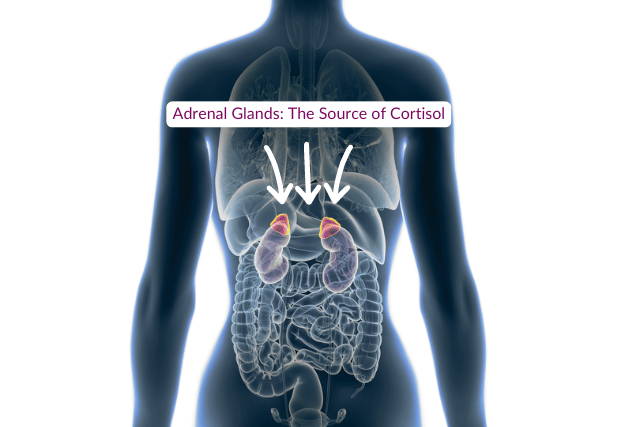When it comes to weight management, most people think about diet and exercise first. However, there’s a hidden factor that could be sabotaging your efforts—cortisol. Often referred to as the “stress hormone,” this plays a crucial role in your body’s response to stress, and it can have a significant impact on your weight, especially around the belly. But this is just one piece of the puzzle. Let’s explore how it interacts with other factors, such as insulin resistance, to contribute to weight gain.
What is Cortisol?
Cortisol is a hormone produced by the adrenal glands in response to stress. It helps regulate various functions in the body, including metabolism, blood sugar levels, and inflammation. In short bursts, this hormone is essential for helping your body respond to immediate stressors. However, when stress becomes chronic, levels can remain elevated, leading to several health issues, including weight gain.
The Cortisol and Belly Fat Connection
One of the most significant effects of elevated levels is the accumulation of belly fat. Here’s how it happens:
- Increased Appetite: High levels can increase your appetite, particularly for sugary and fatty foods. This can lead to overeating and weight gain, especially around the abdomen.
- Fat Storage: This hormone promotes fat storage, particularly in the abdominal area. This type of fat, known as visceral fat, is not only unsightly but also linked to serious health conditions such as heart disease and diabetes. According to a study published by the NIH, cortisol plays a significant role in abdominal fat accumulation and obesity.
- Muscle Breakdown: It can break down muscle tissue to provide energy in times of stress. Less muscle mass means a slower metabolism, making it harder to lose weight.
The Cortisol-Insulin Resistance Link
The impact doesn’t stop at fat storage; it also plays a role in how your body handles insulin, the hormone responsible for regulating blood sugar levels. Here’s how this can contribute to insulin resistance:
- Elevated Blood Sugar Levels: When levels are high, the body releases more glucose (sugar) into the bloodstream to provide quick energy for a “fight or flight” response. Over time, consistently high blood sugar levels can lead to insulin resistance.
- Increased Insulin Production: To manage the higher blood sugar levels caused by stress hormones, the pancreas produces more insulin. However, chronic stress can cause cells to become less responsive to insulin, a condition known as insulin resistance.
- Weight Gain: Insulin resistance makes it more difficult for the body to use glucose effectively, leading to increased fat storage, particularly in the abdominal area.
More Than Just Cortisol: A Multifaceted Issue
While stress hormones and insulin resistance are key players, they are not the only factors contributing to weight gain and belly fat. Other elements such as diet, sleep, gut health, and inflammation also play crucial roles. It’s essential to take a comprehensive approach to weight loss that considers all these factors.
How to Manage Cortisol and Insulin Resistance
Managing stress hormone levels and preventing insulin resistance is crucial for both your overall health and your ability to lose weight. Here are some strategies to help:
- Balanced Diet: Focus on whole foods that stabilize blood sugar levels, such as lean proteins, healthy fats, and fiber-rich vegetables. Avoiding processed foods and excessive sugar can prevent blood sugar spikes and reduce insulin resistance.
- Regular Exercise: Physical activity helps improve insulin sensitivity and reduce stress hormone levels. A combination of aerobic exercise and strength training is particularly effective.
- Stress Management: Techniques like mindfulness, meditation, and yoga can help reduce stress and lower hormone levels. Regular physical activity is also effective in managing stress.
- Prioritise Sleep: Lack of sleep can elevate stress hormones and worsen insulin resistance. Aim for 7-9 hours of quality sleep each night.
The Role of Gut Health in Cortisol and Insulin Regulation
Your gut health plays a pivotal role in regulating both stress hormones and insulin levels. An imbalanced gut microbiome can lead to increased stress, higher hormone levels, and insulin resistance. On the other hand, a healthy gut can help modulate the body’s stress response and improve insulin sensitivity.
Supporting your gut health with a diet rich in fibre, fermented foods, and probiotics can improve your body’s ability to handle stress and maintain balanced hormone and insulin levels.
Incorporating Cortisol and Insulin Management into Your Weight Loss Strategy
If you’ve been struggling to lose belly fat despite your best efforts, it’s time to consider stress hormones and insulin resistance as key factors. By managing stress, improving your sleep, supporting your gut health, and following a balanced diet, you can lower stress hormone levels, improve insulin sensitivity, and create an environment in your body that’s more conducive to weight loss.
Our personalised treatment plans incorporates these strategies to help you not only reduce belly fat but also manage hormone levels and prevent insulin resistance effectively. Through balanced nutrition, stress management techniques, and a focus on gut health, this program offers a holistic approach to weight loss.
Conclusion: Don’t Let Cortisol and Insulin Resistance Sabotage Your Weight Loss Goals
Cortisol and insulin resistance might be hidden factors in your struggle with belly fat, but with the right approach, you can manage their impact. By addressing the root causes of elevated stress hormones and insulin resistance, you can improve your overall health and finally achieve the results you’ve been working towards.
Ready to take control of your hormone levels, prevent insulin resistance, and start losing belly fat? Book a consult today and kickstart your journey to a healthier, stress-free life, book in here.
Ready to Tackle Belly Fat and Feel Your Best?
Take the guesswork out of fat loss and jumpstart your health with my 21-Day Belly Fat Challenge!
✔️ Easy-to-follow Mediterranean meal plan
✔️ Daily tips to boost metabolism and energy
✔️ Weekly Q&A sessions for extra support


Yes please